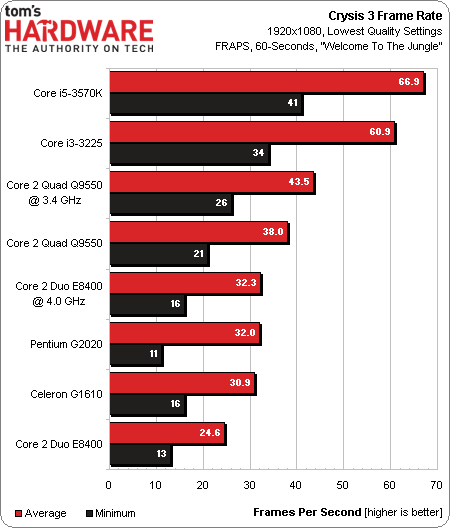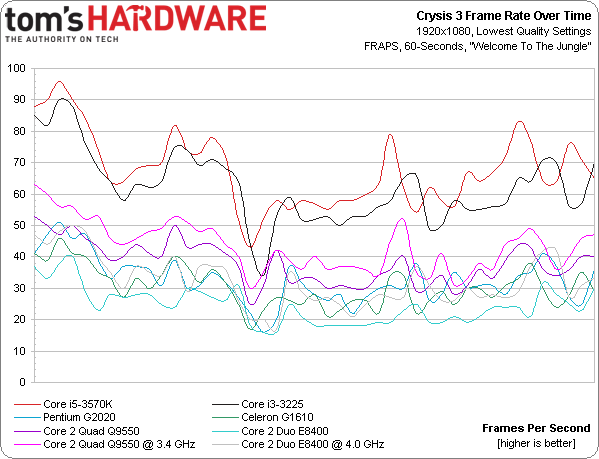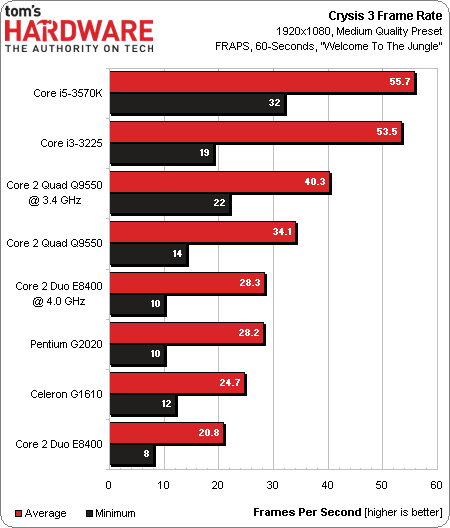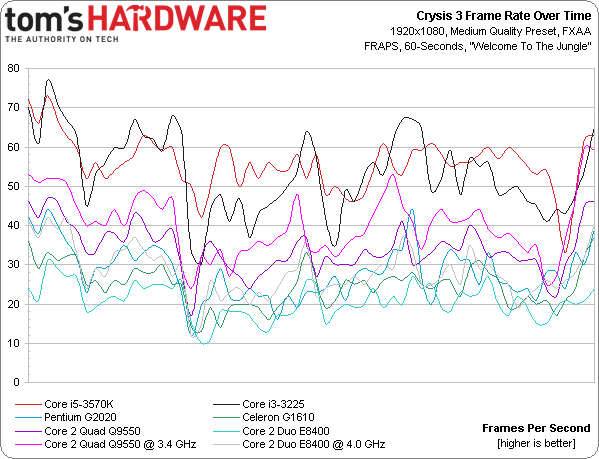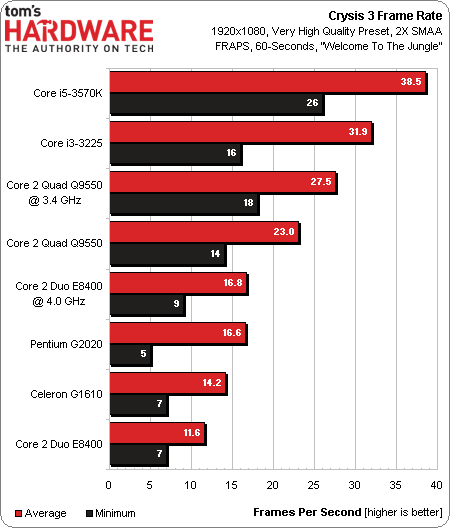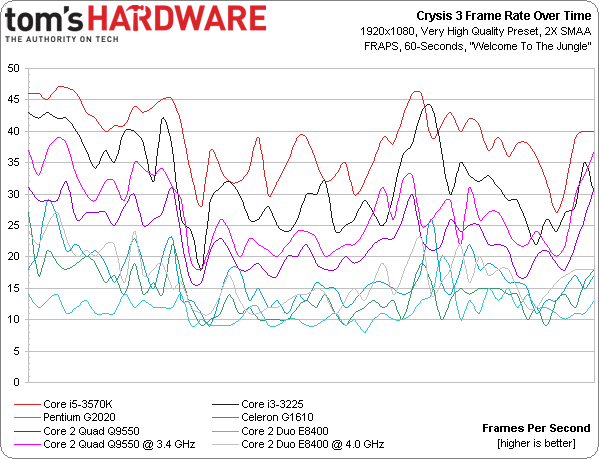Is This Even Fair? Budget Ivy Bridge Takes On Core 2 Duo And Quad
Reader requests affect much of the work we do, and we constantly receive email asking for this one: compare Intel's older Wolfdale- and Yorkfield-based designs against today's budget-friendly Ivy Bridge-based processors. Well, you asked, and we deliver.
Results: Crysis 3
We use a brutal sequence depicting a worst-case scenario for how these processors handle Crysis 3. The game is so CPU-dependent that we'll start by dropping down to the lowest quality before moving on to more interesting settings.
While you will certainly see higher performance in other areas of this game, you can’t bypass this sequence while playing through the single-player campaign. At the least-demanding settings, not one of our dual-core processors could come close to matching the stock Core 2 Quad Q9550 for playability. We’re not going to condemn dual-core CPUs as unfit based on one game alone, but if this doesn’t improve with a patch of some sort, it's bad news.
Again we need to point out differences between Fraps' reported minimum frame rate and the logged data. In fact, we used this exact data as an example to seek feedback from AMD and Nvidia. While every one of these processors varied from one to three frames per second, the Core i3-3225 experiences a huge 11 FPS difference. The slowest second logged 30 frames, yet the minimum was reported to be 19.
Subjectively, both the Core i5 and Core i3 deliver a fairly smooth experience at these settings. The Q9550 was very playable once we overclocked it, but noticeably slower at stock speeds. Repeating this run two to three times on each dual-core CPU was an almost painful experience.
While I won’t say that the Core i3 or 3.4 GHz Core 2 Quad were completely unplayable, the Core i5-3570K is the only processor I can whole-heartedly recommend for Crysis 3. Very High details demand expensive graphics hardware, and big graphics warrant the balanced platform only a fast quad-core CPU (or higher) can deliver.
Get Tom's Hardware's best news and in-depth reviews, straight to your inbox.
-
ASHISH65 Wow! this is the review i am waiting from long time.Really good one for budget gamers.Reply -
DarkSable Now this is cool stuff.Reply
Also, amoralman, did you read this? It's basically assuring you that your C2D is still awesome as a budget processor. -
Steelwing Very nice review! I've got a C2D E6600 (2.4 GHz) and had been considering the Core i5-3570K (or possibly wait for a Haswell i5) and was wondering about the performance differences. My CPU is still good for a lot of apps, but I can definitely see a reason to upgrade.Reply -
AMD Radeon pentium dual core G2020 is the minimum i can recommend to budget gamers. i often listed it in sub 450 gaming PCReply -
lpedraja2002 Excellent article, I'm glad I have a more accurate idea on where I stand based on CPU performance, I'm still using my trusty Q6600, G0 @ 3.2ghz. Its good that Tom's still hasn't forgotten that a lot of enthusiast still are rocking Core 2 architecture lol. I think I can manage until Intel releases their next revolutionary CPU.Reply -
assasin32 I been wanting to see one of these for a long time but never thought I get to see it. I just wish they had the good ol e2160, and q6600 thrown into the mix. I have the e2180 OC to 3ghz. It's still chugging along surprisingly enough, I just realized how old the thing was last night after thinking about how long I've had this build and looking up when the main components were produced. Safe to say I got my use out of that $70 cpu, did a 50% OC to it :) and it still had room to go but I wanted to keep the voltage very low.Reply -
jrharbort I've always been curious about how well my own Core 2 Duo P8800 (45nm & 2.66GHz) would stand up against modern ivy bridge offerings. And even though I'm talking about he mobile space, I'm guessing the gains would be comparable to those seen by their desktop counterparts. Each day I'm reminded more and more that I seriously need to move on to a newer system, especially since I work with a lot of media production software. Thanks for the article, it provided some interesting and useful insight.Reply -
smeezekitty Kind of interesting that the old Core 2s beat the I5 in tombrader with TressFX on.Reply
Also holy crap on 1.45 vcore on the C2D -
Proximon I would not have predicted this. Not to this extent. I hope we can make these broader comparisons across years more frequently after this. I predict this will be a very popular article.Reply
